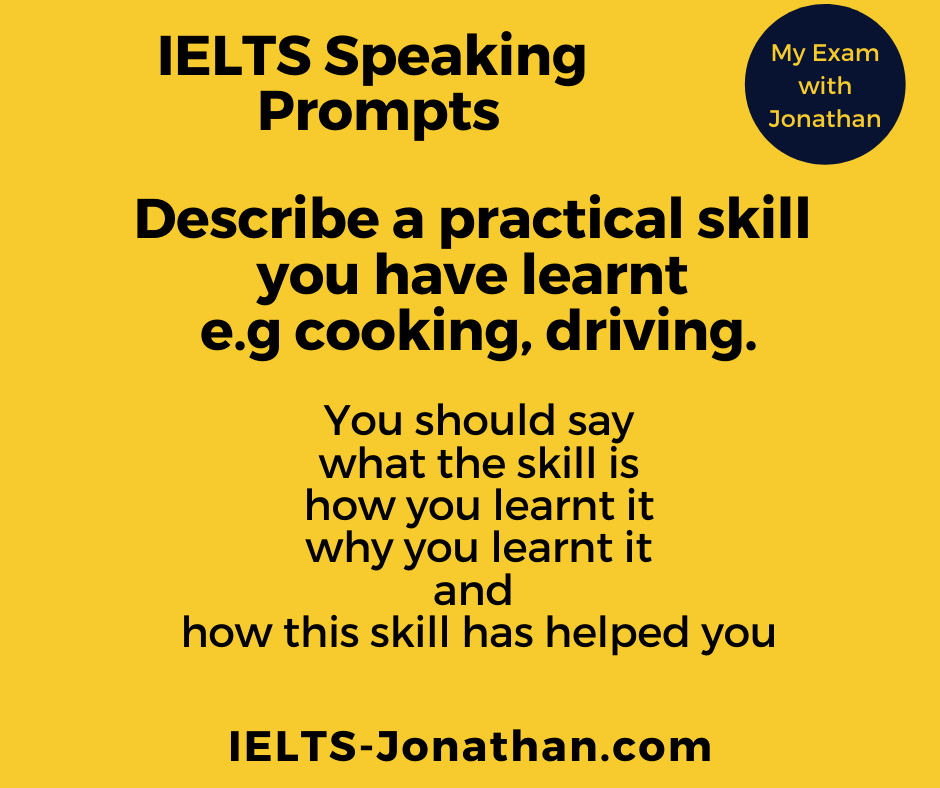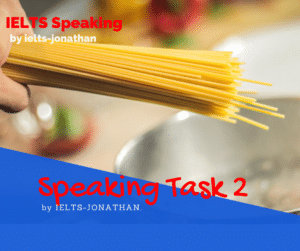Why is the second part of the IELTS Speaking test sometimes the most difficult, even Native Speakers.
But don’t despair it can also be the easiest part, and the most enjoyable.

There is a valid reason for this part of the IELTS test, and I will explain this below.
One reason for Part 2 is to allow the candidate speak at length and meet the fluency criteria.
A second reason is to allow the examiner to grade your ability for the follow up questions in Part 3.
They are trained to listen carefully for language range, grammar accuracy and pronunciation is normal speech.
They can then chose the best question sets in Part 3 that allows you to display your real language ability. So it’s important to fill that 2 minutes the best you can.
IELTS Part 2 Structure
You are given a set of prompts and a question.
The prompts are not particularly challenging, but follow a pattern to give you ‘ideas’ and ‘structure’ for your 2 minute talk.
This gives the examiner ‘a further opinion‘ to your level, ready for Part 3.
One way to do well in this section is to try and relax.
A relaxed candidate always performs better and responds well.
If you don’t understand something, always ask the examiner to repeat the prompt question.
The examiner can’t help you directly, but repetition might help you understand the prompt better.
Other tips are
- Don’t give the examiner an opportunity to ask ‘can you say anything else about that’.
- Speak for the full 2 minutes until the examiner stops you.
- Don’t hesitate too much, you are allowed to make some mistakes, it’s natural.
- Connect your sentences and use the structure given in the prompt.
- Attempt to use complex sentences rather than short, simply ones.
and
- Don’t be afraid to correct yourself.
What if you really don’t understand the prompt or even worse the prompt doesn’t apply to you?
If you’re preparing for IELTS, and feel you cannot answer some of the speaking questions properly, simply because they really do not apply to your current life experience, then don’t worry as you’re not alone.
For example:
Q. Talk about an object you own that is especially valuable or important to you.
Problem: I have a quite spartan lifestyle and I don’t have any emotional attachment to any objects I own.
Q. Talk about an object that has had great influence in your life, and explain how it influenced your life.
Problem: While I could talk for hours about books that I love, I don’t really feel that there is a book that has truly influenced my life.
Describe a practical skill you have learnt e.g cooking, driving.
You should say
what the skill is
how you learnt it
why you learnt it
and how this skill has helped you
I am going to talk about a practical skill I learnt and developed when I was young. I learnt this skill with my best friend from school, Alan. Alan’s parents, who owned a small house surrounded by lots of land, gave him the old family car so he could learn to drive on their private land. When Alan said he was learning to drive in an old car in his garden, I jumped at the chance to visit and secretly hoped I’d get a chance to try and drive this car too, which I did.
By the time I was 17 and ready to take my driving test, I already felt quite confident that I could pass the driving test with ease. However, my parents insisted I have lessons with a professional driving instructor, and they paid for a few lessons. While the instructor was impressed with my confidence and ability to steer and change gears, he was critical of my road sense and so I had to take a few more lessons where I got used to using the mirrors and being aware of my speed. I also got used to other road users and did practical tasks like reversing the car and parking. I also had to study, learn and revise the Highway Code.
I generally think that for a 17-year-old boy there is quite a lot of pressure to pass your driving test and own your first car. Personally, I was also tired of walking, using a bike or bus or relying on my parents for lifts and being able to go places whenever I wanted made me feel suddenly independent and grown up. I also felt more popular with my friends and we would go out in the car, just because we could. Since then, being able to drive has helped me in so many ways. I don’t live in the city centre and where I live you can’t rely on public transport to get to work, it would take too long and is quite expensive, so I commute by car most days but having a car makes life so much easier when it comes to other things like shopping or visiting family and friends. For example, last week, I took my elderly parents to Birmingham to visit relatives and I couldn’t have done that as easily by train.
Solution to this problem
IELTS is a test of your language ability, not intelligence or knowledge.
You may think the IELTS test is an interrogation, but you don’t really need to answer with the truth.
However, I would feel more comfortable with the be honest approach, even if it does not directly answer the question.
You would probably be able to answer more naturally, and therefore be more fluent.
Which one do you think is a better strategy?
You can use tips and information on this website to help make it easier to obtain a higher score, but remember you still need to work at learning the language to be successful.
Please share to someone you know and in the meantime take a look at my Facebook Page and Website for IELTS answers and you can also join my Facebook Group here too.
Good Luck
Jonathan
I’m Jonathan I’ve taught IELTS and University English in more than a dozen universities and schools around the world. I’m a parent, traveller and passionate about language teaching and helping students achieve their dreams. Whilst living in Austria or working in Asia, I run IELTS courses to help students get to where they want to be. If you are serious about IELTS, connect with me to see how I can help you.



